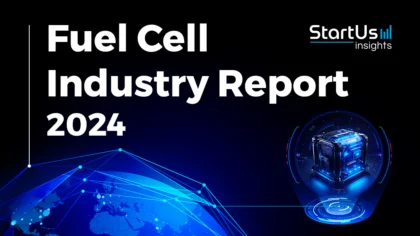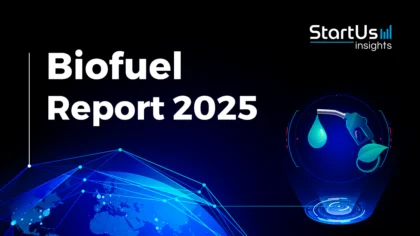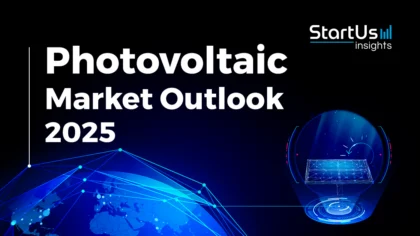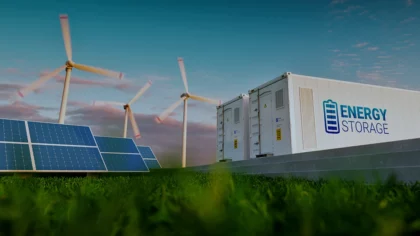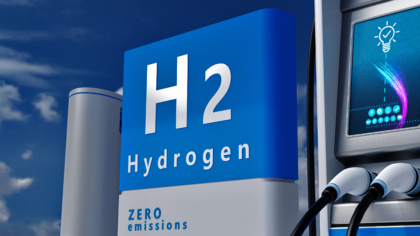This 2024 Fuel Cell Industry Report examines a sector contributing to global efforts to reduce carbon emissions. With new applications in battery and energy storage systems, fuel cells emerge as a promising solution for future energy storage demand. This report discusses the innovations, challenges, and expansion of the sector. It explores the advancement in fuel cell efficiency, market expansion, and the strategic investments shaping the industry.
This report was last updated in July 2024.
This fuel cell report serves as a reference for stakeholders within the industry, investors, policymakers, and economic analysts, providing a snapshot of the industry’s health to map its trajectory for innovation and growth in the coming years.
StartUs Insights Fuel Cell Industry Report 2024
- Executive Summary
- Introduction to the Fuel Cell Industry Report 2024
- What data is used in this Fuel Cell Industry Report?
- Snapshot of the Global Fuel Cell Industry
- Funding Landscape in the Fuel Cell Industry
- Who is Investing in Fuel Cells?
- Emerging Trends in the Fuel Cell Industry
- 5 Fuel Cell Startups impacting the Industry

Executive Summary: Fuel Cell Industry Outlook 2024
This report is created using data obtained from the Big Data and AI-powered StartUs Insights Discovery Platform, covering more than 4.7 million global companies, as well as 20K+ technologies and emerging trends. We also analyzed a sample of 430+ fuel cell startups developing innovative solutions to present five examples from emerging fuel cell industry trends.
- Industry Growth: The fuel cell market report shows a slight downturn in the last year (-0.41%), and the sector comprises more than 4300 companies.
- Manpower & Employment Growth: The industry employs 644000 people worldwide. Last year, it saw the addition of over 30K new positions due to sector expansion.
- Patents & Grants: The sector registered 25000+ patents and has been granted 2065 grants.
- Global Footprint: Strong presence is seen in the USA, Germany, UK, India, and Canada, with top city hubs in London, Sydney, Singapore, Melbourne, and Vancouver.
- Investment Landscape: The fuel cell industry holds an average investment of USD 58 million per round, with over 1680 funding rounds closed.
- Top Investors: Leading investors including European Investment Bank, CPP Investment, TPG, and more have collectively invested more than USD 2.7 billion.
- Startup Ecosystem: The five top startups include Falcon Fuel Cells (High-Temperature PEM Technology), Prometheon Technologies (Hydrogen Storage), Hywave Tech (AI Fuel Cell Systems), Tvisi Motors (Fuel Cell Electric Vehicles), and NXN Systems (Waste Energy Utilization).
- Recommendations for Stakeholders: Continue to track innovation as big breakthroughs are imminent. Address the adoption of fuel cell energy/battery systems and invest in emerging and related trends like synthetic graphite and urban air mobility.
Explore the Data-driven Fuel Cell Outlook for 2024
The fuel cell industry report 2024 uses data from the Discovery Platform and highlights the key metrics that underline the sector’s dynamic growth and innovation. The heatmap illustrates the global distribution and intensity of activity within the fuel cell startup ecosystem. Our database shows 437 startups within the 4330+ companies in the industry.
Despite a slight industry contraction of -0.41% over the last year, the intellectual property landscape involved 25K+ patents and 2065 grants. The sector employs a global manpower of 644000 individuals, experiencing an employee growth surge of over 30000 in the last year alone.
The top five countries for innovation and company development include the United States, Germany, the United Kingdom, India, and Canada. In terms of cities, Sydney, Singapore, Melbourne, Vancouver, and London stand as the top hubs in the world. These hubs emerge as key centers enabling startups to further their R&D and expansion plans.
What data is used to create this fuel cell industry report?
Based on the data provided by our Discovery Platform, we observe that the fuel cell industry ranks among the top 5% in the following categories relative to all 20K topics in our database. These categories provide a comprehensive overview of the industry’s key metrics and inform the short-term future direction of the industry.
- News Coverage & Publications: The fuel cell industry had over 8040 publications in the last year.
- Funding Rounds: The sector completed around 1680 funding rounds.
- Manpower: The industry employs more than 644000 individuals with an addition of more than 30000 new employees in the previous year.
- Patents: The industry filed 25000+ patents, showing an increase in innovation activity.
- Grants: Demonstrating a strong commitment to research and development, the industry has secured 2065 grants.
- Yearly Global Search Growth: The industry experienced a decline in yearly global search growth, down by 3.7%.
A Snapshot of the Global Fuel Cell Industry
The fuel cell industry witnessed considerable growth and investment, highlighting its stability and an upward trajectory. Approximately 644000 employees work to support the industry’s operations and innovation.
With this, 30000 new workers joined this workforce in the previous year. Moreover, the industry offers a competitive landscape with roughly 4330 companies inside its ecosystem.
Explore the Funding Landscape of the Fuel Cell Industry
Financially, the industry observes more than USD 58 million committed per funding round. The investment community includes more than 600 investors participating in the industry’s future. This widespread investor interest culminated in more than 1680 funding rounds being successfully closed. Moreover, over 700 companies received investments, highlighting the multitude of opportunities that investors are willing to back financially.
Who is Investing in Fuel Cells?
The potential of the industry is underscored by the combined investment value of more than USD 2.7 billion.
- The European Investment Bank invested totaling USD 540.4 million across three companies.
- CPP Investment invested USD 500 million in at least one company.
- TPG matches this move with an equivalent investment of USD 500 million in at least a single entity.
- IDEX contributed USD 470 million to the pool, again focusing its resources on at least one company.
- Anglo American spreads its investment of USD 400 million over two companies, balancing its portfolio with a dual investment strategy.
- Cummins, investment in three companies with a sum of USD 290 million, indicates a strategic spread of investment to drive innovation across multiple fronts in the industry.
Access Fuel Cell Innovations & Industry Trends with the Discovery Platform
Explore some details about the top emerging fuel cell industry trends in the last year:
- Hydrogen Fuel Cells represent about 1352 companies, employing 193K+ individuals globally. 15.2K new workers joined the sector’s employment in the previous year. Further, the yearly trend growth rate of 2.15% indicates a rise in the utilization of hydrogen fuel cells.
- Water Electrolysis, although represented by a smaller cluster of 176 companies, witnessed a surge with an annual trend growth rate of 37.37%. It employs 13.1K people, with 796 new hires in the past year.
- Upcycling shows its industry presence with 3281 companies engaged, reflecting the scale of its global impact. The industry employs 131K people, and in the last year, it added 9.8K new workers. The 8.47% yearly trend growth rate showed the expanding interest in recycling batteries and energy storage systems.
5 Top Examples from 430+ Innovative Fuel Cell Startups
The five innovative startups showcased below are picked based on data including the trend they operate within and their relevance, founding year, funding status, and more. Book a demo to find promising startups, emerging trends, or industry data specific to your company’s needs and objectives.
Falcon Fuel Cells uses High-Temperature PEM technology
US-based startup Falcon Fuel Cells develops fuel cell systems for unmanned aerial vehicles (UAVs). It uses high-temperature proton exchange membrane (HT-PEM) technology to multiply the UAVs’ flight duration. The startup’s proprietary fuel cells provide greater endurance to support UAVs for sustaining longer flights and carrying heavier loads. These fuel cells accommodate renewable and hydrocarbon fuels, and the startup’s fuel cell power plants assist military surveillance and retail delivery applications.
Prometheon Technologies offers Hydrogen Storage using Water Mist
Belgian startup Promethean Technologies develops an integrated solid-state hydrogen storage system, H-BAT, using water mist. This startup utilizes a metal-free, eco-friendly water-electrolyte to ensure a clean energy process. The non-gaseous and secure H-BAT energy storage employs environmentally friendly catalysts to avoid toxic metals. To ensure sustainability, the materials resist degradation from electrochemical use and provide longevity without cell fatigue.
Hywave Tech provides Artificial Intelligence Fuel Cell Systems
Chinese startup Hywave Tech provides AI-driven fuel cell systems. The fuel cell system assembles multiple subsystems, including fuel supply and thermal management, for electricity generation. Hywave Tech also develops a fuel cell system controller, an automotive-grade, rapid prototyping controller. This controller, with automated code generation, streamlines the development process for strategy and control algorithm development. It manages parameters and coordinates control components to ensure stability in the fuel cell systems operation.
Tvisi Motors develops Fuel Cell Electric Vehicles
UK-based startup Tvisi Motors offers zero-emission vehicles powered by hydrogen fuel technology. These vehicles feature rapid refueling capabilities and handle heavy payloads. By utilizing hydrogen, the startup continuously generates electricity and heat, with water as the only byproduct. Additionally, Tvisi Motors integrates high-energy-density solid-state batteries and axial flux motors to enhance both performance and safety.
NXN Systems utilizes Waste Energy
South Korean startup NXN Systems provides technology enhancing traditional power generation to fuel cell systems by using wasted energy. It provides solutions such as data center cooling using waste heat to enhance energy utilization in cold storage warehouses, and advance biogas production facilities’ efficiency. In addition, NXN Systems also offers mechanical energy storage, which lowers waste and improves grid safety. The startup’s approach saves energy and CO2 emissions in data center operations and frozen storage facilities.
Gain Comprehensive Insights into Fuel Cell Trends, Startups, or Technologies
The 2024 Fuel Cell Industry Report shows a sector emerging as a dynamic contributor to the energy transition. The infrastructure, regulatory backing, and technological advancements contribute to the industry’s expansion and adoption. Decarbonization and sustainable practices will provide a boost to fuel cell producers. Contact us to explore all 430+ startups and scaleups, as well as all industry trends impacting energy companies.


